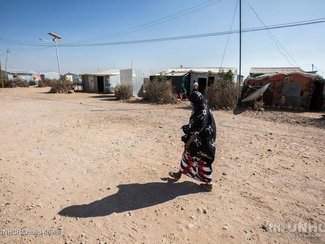
The Untold Story From the Community
Irregular migration, tahriib in Somali, has a horrible effect on the communities that are left behind, both financially and psychologically. This is less discussed by the community or in the media. Families suffer in silence and rarely have the opportunity to talk about the effects of Tahriib on those left at home.
“When I start to think about tahriib it really brings up some bad memories,” says Asad, who lives in Bosaso, the third most populous city in Somalia. “In our case, we lost our older brother to tahriib. And among our closest family members, around 10 have embarked on the journey.”
Asad lost his older brother to the Mediterranean sea, and then his sister decided to embark on the same journey— despite her knowledge of the potential consequences and what they’d gone through as a family.
The departure of Asad’s siblings has also taken a toll financially. His family has been forced to use everything they have to pay off smugglers, including all that they’d invested in businesses.
“In 2015 my own sister decided to take the journey to Europe and we spent 8,000 dollars on her, which has ruined us financially,” he says.
According to Asad, the financial implications have been so great that many in his community are now living in rented apartments; having been forced to sell their own houses just to collect enough money to pay off smugglers and save their loved ones in Libya.
The psychological impact of tahriib is just as great. Many of the mothers in Asad’s community have become traumatized after hearing news of their child’s imprisonment or death at the hands of smugglers.
Asad recalls his own moment of despair when he first heard his sister had left. “I tried to search for her, and drove 100 km worried, just trying to find her… all I could think was,
“Will Al Qaeda recruit her, will she be sold to ISS, or will she become a victim of human trafficking?’ Those are the things that come straight to mind.”
Asad’s own mother, distressed by the unknown of what was happening to her daughter, did everything she could to try and save her— selling the house and all the gold she owned.
Asad says that, these days, you will see mothers begging in front of the mosque, restaurants, and public spaces— women who you would have never seen begging before. Because of the circumstances they now find themselves in, they have no other choice.
As for the fathers in the community, Asad recalls an older man’s reaction when he found out his own son had embarked on the journey. As soon as he heard the news he became paralyzed. Now the family finds themselves in an impossibly burdensome dilemma— should they use their earnings for the father’s well-being, or should they pay the ransom money for their son?
In Asad’s opinion, the journey isn’t worth it for anyone. He says he is yet to meet a person coming back from Europe who has anything to show for it.
“I haven’t seen anyone who’s gone to live in Europe coming back and buying houses, or sending their own parents to hajj, or even buying them a car,” says Asad. “I haven’t seen parents grateful for their children going to Europe. If you have nothing to show for it, it would have been wiser for you to stay back home… even if your country is fragile, at least it is yours.”
Asad is an employee of UNHCR in Somalia
